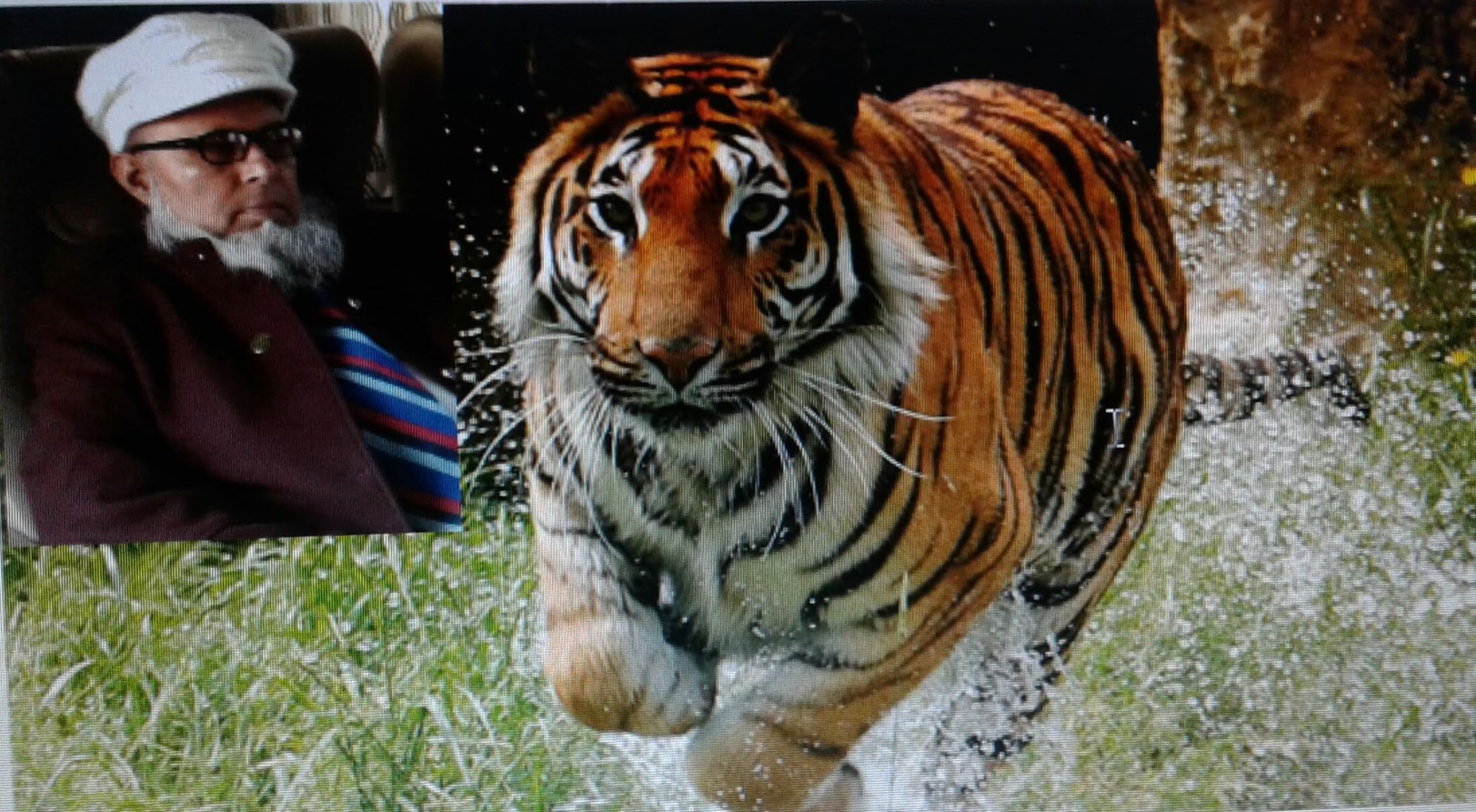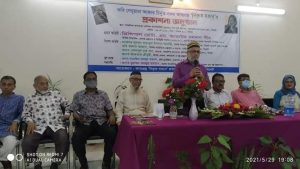Prof. Dr. Gazi Abdulla-hel-Baqui:
(The event of this tiger hunting is true and collected by the writer.)
Supati Forest office is located under Sharankhola range in Bagerhat district. It was the Bangla year of 1357. Hundreds of Bawalis and fishermen collected tickets from the Forest office and entered the forest. The Bawalis cut down Sundari, Garan, Bain, Bola, Possur, Khakra, Hetal trees etc. and used to send these in the form of wood to different districts like Khulna, Barishal, Patuakhali, Dhaka, Noakhali and other places by large boats. On the other hand, the fishermen used to catch fish like prawn, kain, coral, jaba, slate, dhatni etc. So their activities were going on in full swing in the jungle.
During that time, unexpectedly, a tiger created terror by killing one Bawali and one fisherman. So, many of them left the area. The Forest official, after hearing the news, arranged to send hunters to the area to help strengthening their security. Moreover, thinking of the terrific situation, the Forest officer wrote a letter to Meher Gazi to reach Supati as early as possible. Meher Gazi accompanied by one of his grandsons Hyat Ali accompanied by another two persons arrived at Supati by his own boat. He at once started for Katka where the two people were killed by the ferocity of the man-eater.
As a hunter Meher Gazi was not alone. There were some more expert hunters and Madar Sheikh was one of them. They were looking for the tiger for four days and their search was very difficult because of impenetrability and gloomy atmosphere of the verdure forest. On the fifth day the death news of a Bawali came from the bank of a canal at Patakhata. The victim could not seize a moments chance to voice a sound. Other Bawalis got the corpse in the dense forest but meanwhile half of the body was eaten away man eater.
Meher Gazi was sent for. He at once reached there and made a very close search in the surrounding areas. The hunter Madar was also with him. On the fourth day they slogged a long jungle path deep into the forest from the canal and just behind a bush afar, they heard a kind of sound. They advanced crawling and found the tiger in a dense patch of bush eating a large deer. Meher Gazi moved ahead more but did not have a chance of firing. Under compulsion, he had to stand and as he did it, he was viewed by the tiger. Meher Gazi fired his gun and the tiger giving a loud roar disappeared into the forest. Going ahead he found the blood of the tiger and as the
darkness was approaching, he left following the tiger and made a retreat to the boat for that day.
The next day Meher Gazi taking Madar Sheikh with him entered the forest in quest of the wounded tiger. A wounded man-eater is more dangerous and grows more ferocious than any other animal in the wilderness. They reaching the spot where the half-eaten Bawali was laid in a bush and following the pug-marks and blood- marks started advancing. The two hunters having the guns, Madar Sheikh was in the front. At a spot in the middle of a thorny Hetal bush they halted abruptly. The two experienced hunters sensed through their Sixth Sense that the tiger was close at hand. After a little while, the angry tiger gave a loud growl and coming out of the thick bush jumped on the head of Madar and in the wink of an eye leaving the fallen Madar bit the hand of Meher Gazi and the next moment made itself invisible into the forest. The two hunters were quite unaware of this situation. They did not have a chance to move backward.
Lying flat on the ground the injured Meher Gazi called loudly Hyat and others waiting in the boat. They came running and took Madar in embracing position to the boat but he died on the jungle path. The wounded elbow of Meher Gazi was hanging with the skin and he was also brought to the boat. After finishing the act of death-record in the Forest office quickly, they rowed the boat homeward. The bandage on the hand of Meher Gazi stopped bleeding but it took two days to reach the village of Madar for delivering his corpse and in the meantime the wound of Meher Gazi got rotting. As a result, severe pain and bleeding started and all kinds of herbal treatment failed. At the age of seventy, the greatest hunter of the Sundarbans killing more than fifty Royal Bengal Tigers breathed his last. His Janaja was attended by a large number of people.
After one month of the death of Meher Gazi, his son Pachabbdi Gazi was sent for by the Forest office. Because, by this time, after the healing of its bullet-wound, the man-eater at Supati turned more wild and within fifteen days, it killed more three forest-goers. Pachabbdi could not forget about this tiger for a single moment during those mournful days, because it was the cause of his fratricide. Pachabbdi along with his two younger brothers and nephew Hyat Ali started for Supati in their own boat. At night the boat reached the Forest office and they slumbered there. The next morning taking the gun and bullets from the Forest office they rowed to the spot where the two great hunters were mortally assailed by the large wild beast. The boat was left at Katka.
The quest of the man-eater continued for days and nights. More hunters and Forest officers appeared there. During day-time the hunters, using the boats and sometimes on foot even employing all types of devices and stratagem, were in search of the tiger. At night the traps on the possible spots where the man-eater might roam about were set, but all such attempts failed. Four days elapsed and in the meantime the tiger picked up one Bawali from the bank of a canal at 4 pm.
Seeing the tiger, he fell flat on his chest on the ground but the tiger caught hold of his head with his large mouth agape and took him away as a cat catches a rat and takes away running. But for fear of the terrific nature of the tiger no body moved to rescue the dead body.
More two hunters came and the three people along with fifteen Bawalis reached the fringe of the forest and cut a hundred cubits forward inside the jungle and found the recent kill, most of which was already eaten away by the tiger. Still then they thought the man-eater might come to the kill which would provide the beast with some morsels of a meal. A hungry tiger can be found licking the only bones of a dead animal without flesh. The two hunters sat on a big tree which was about forty cubits away from the kill. Pachabbdi with his nephew climbed up a big tree which was about twenty cubits away from the kill. The positions of all the hunters had all the possible chances to shoot down any animal from whichever direction it might come. Then it was twelve at noon. The sun was at the zenith of the sky. The Bawalis talking loudly left the place. Pachabbdi leaning his back against the straight trunk of the tree and resting his feet on the two branches with his knees slightly folded sat comfortably. His nephew Hyat Ali sat on a branch above his head. The left-overs of the dead body were visible to them. The two lustreless big open eyes on the head of the kill
put on a loathsome appearance.
Two hours flew away in profound silence. Suddenly the call of a deer was heard from the beyond of a canal flowing on the left side. Then again silence. Towards the late afternoon, the callings of the deer, monkeys and wild cocks from different directions were sounded frequently but did not seem to be fearful. At five the darkness enveloped. The two hunters from their tree called Pachabbdi Gazi who responded and got down from his tree. The tiger likely sensing its safety, or the
presence of the hunters, it could not come and because of that reason, the hunters buried the dead body of the Bawali on the bank of the canal and returned to the boat. In perplexing thoughts Pachabbdi fell into a sleep in the boat. On the morrow at seven, having warm rice and pan Pachabbdi with Hyat Ali started for their mission and was tirelessly searching the man-eater here and there in the forest. At noon two forest officials hurried to them in a dinghy told them that a little span of time ago a tiger picked up a Bawali from the place between the canal at Katka and
the canal at Dora.
They without wasting a moment reached the spot plying the boat quickly. The tiger hid itself inside a bush the ground of which was very soft. So when the wild beast jumped on the Bawali with a thump roaring, it created a hole on the soft ground. Following the pug-and-blood-marks, they moved straight towards the south and after a while, they found the loin-cloth of the Bawali on a low branch of a tree and the drag-marks of his feet-fingers for about five hundred cubits. During this time
the animal did not halt for a single moment, putting the kill on the ground. In course of such a quest, they at last discovered the kill inside a hedge on the bank of a small canal. The tiger took only some gulps from the belly of the kill and the whole body was lying folded.
The time was about half-past one. The sunlight would continue casting its rays there in the wintry Sundarbans for more four hours. Pachabbdi Gazi got up a big Possur tree and sat on his branch which was about fifteen cubits away from the kill. That branch was nine cubits up from the ground and over his head, Hyat Ali took a two-branched seat. On that day Pachabbdi Gazi was the only hunter. At this dismal moment, the face of his dead father Meher Gazi flashed across his mind. He examined his gun carefully for the last time. Their positions were more or less secret as a lot of branches could curtain them. The other Bawalis and his two brothers shouting loudly retreated to the boat.
Almost forty minutes glided on. The hunters on the tree were as if unaware of the feeling of their breathing. About thirty cubits away from the kill in a thick patch of hedges, a line of yellow colour seemed to move away. Eyes might commit mistake. However, Pachabbdi raised the butt of the gun against his shoulder inch by inch. Within two minutes the tiger came out of that bush on the south. The animal raised its head for once and began walking towards its kill with brisk steps. Reaching the kill the great beast hurled a sharp bite on the dead body of the Bawali and it gave such a pull that the whole body rose half a cubit up and fell down on the ground with a thumping sound. Pachabbdi shot at the head of the man-eater. Without any roar, groaning and noise, the huge Royal Bengal fell on the kill. He fired a second shot and cried out, Allah, Allah, Allah, Allah, Allah. From the boat afar the same word was resounded. They got down from the tree and stood by the dead man-eater with its mouth pointing downwards. The bullet damaged its head. The tiger was ten feet and a half long in size. Taking the prize money Pachabbdi returned home and reported the news to his mother who raised her hands and said, O, my son, the two tigers that harmed your father are killed by your own hand.
The writer is a poet, a translator and an academician.










